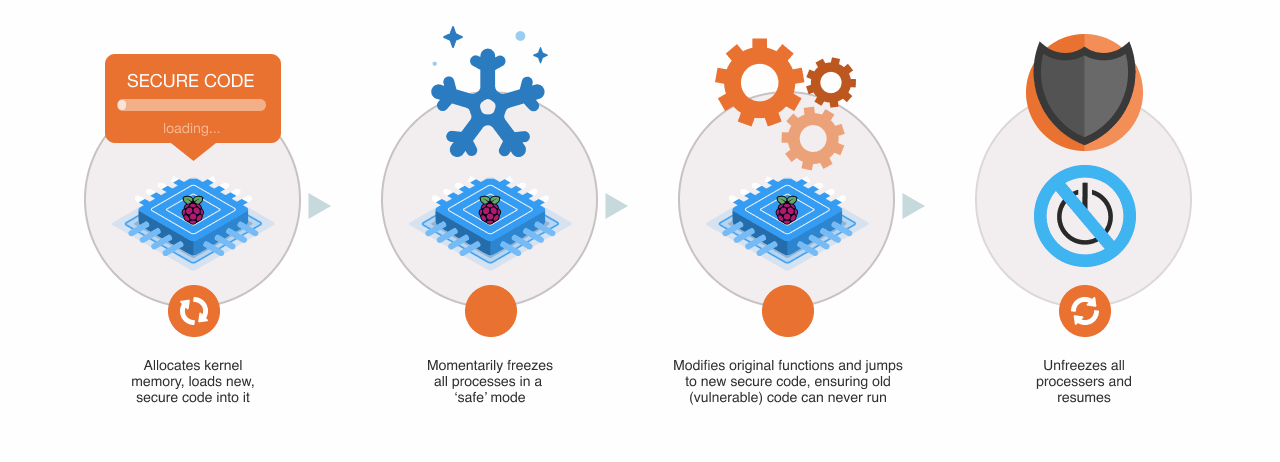TuxCare Free Raspberry Pi Patching
Live Patching of Linux kernels for non-commercial projects
* to patch commercial embedded systems, visit this page.
Irrespective of its application, any Raspberry Pi can be targeted by hackers. Whether you use your Raspberry Pi for your development hobby, gaming, or as a security-critical component in your home network, it may be vulnerable to attack. Basic security measures include changing default usernames and passwords, requiring a password to access your sudo operating system, or adding key-based authentication for your Secure Shell Protocol. All these rudimentary measures can help improve security, but alone they are not enough. Therefore, it is essential to keep all Raspberry Pi software up to date with the latest updates and security patches. To use Raspberry Pi live patching for commercial projects, visit TuxCare – KernelCare IoT page
How does kernel patching for
Raspberry Pi work?

The free Raspberry Pi KernelCare patching service provided by TuxCare updates the Linux kernel running on r-pi based systems without disruption or downtime. with TuxCare, enthusiasts’ projects can enjoy the same ease of use and security that thousands of professional installations using TuxCare already experience but at no cost.
Video Overview
Supported Distributions



Supported Chipsets



FAQ
What is the free Raspberry Pi kernel patching by TuxCare? Who is it for?
KernelCare is a live patching technology that supports the application of patches to an actively running Linux kernel without requiring reboots. Using it for your non-commercial Raspberry Pi projects is free and helps keep your projects secure and disruption-free.
Is it really free?
Yes, free as in beer. Because we use the same KernelCare IoT capabilities as for our commercial offerings, you’ll have to register to get your license. Still, you won’t receive follow-up by sales or marketing emails (unless you want us to send them).
What distributions and chips are supported?
Currently, we support Ubuntu Focal Fossa on ARM64, with Debian and Raspbian support coming soon. The currently supported chips are ARMv8: BCM2711, and particularly BCM2837.
What if I have a commercial project? How can I use live patching?
We have a dedicated service for commercial projects – KernelCare for IoT – live patching for Linux kernels in ARM-based devices. KernelCare for IoT protects devices with on-the-fly kernel updates. The pricing is customized and provided after a successful proof of concept. You can apply for a free PoC here
How does our free Raspberry Pi kernel patching work?
The Raspberry Pi is just another Linux platform supported by TuxCare Live Patching Services. The live patching process is conceptually easy and totally automatic. You just load the new code into memory, identify the affected functions, pause the processes using these functions, change the pointers to the new code, and resume the processes. This happens transparently and without killing any processes.
How to install KernelCare service on a Raspberry Pi device?
The installation and use of KernelCare for Raspberry Pi is simple: run two commands, add your unique license key and enjoy TuxCare’s security on your Raspberry Pi devices.
How many licenses can I register with one email?
You can register one license per email address. If you have multiple Raspberry Pi devices – feel free to register with different email addresses. If you have a commercial project – it makes sense to apply for a free proof-of-concept of KernelCare IoT.